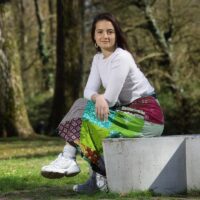Recently, I fell off my bike. Coming from the Rotterdamseweg, I was going a bit too fast for the sharp left turn toward the campus street. Instead of slowing down to avoid slower cyclists turning, I decided to cut across a triangular pedestrian section but did not make the turning angle. I really needed to work on the first presentation of my graduation project that day. Instead, I flew four metres and landed on my chin… oops.
Fascinating how fast a cyclist and a day can be turned upside down…
At first came the frustration – at my own unnecessary recklessness, at the timing, at the pain. As worried faces gathered around me and droplets of blood from an origin I did not know hit the ground, frustration became fear. It was not only about being hurt – I was also anxious about the work undone, the day derailed. Someone called an ambulance and someone else my best friend. As if the day had been written down in advance, I felt close to my friend’s house who was called at the very moment she was stepping out for a walk after a day of turning over childhood memories herself.
A police officer spoke to me in Spanish, seeing my Argentinian ID. My friend appeared. The nurse arrived, smiling at me like sunlight through clouds. And then I realised – it wasn’t so bad. I felt the warmth from the people around me.
I ended up spending the afternoon with my friend both at the hospital to have my mistakes stitched up, and with a long walk to stitch up her mistakes. We were hurt together and I was finally getting stitches on my chin: the childhood classic from jumping on beds or chasing dogs around the house. I had somehow delayed this one until now.
What does it mean to make a childlike mistake as an adult?
No one is going to stop me from going too fast, from choosing the shortcut, from falling
Hopefully, we all grew up with some level of care from others. But care can also protect us from ever making certain mistakes. Now, as an adult, I’m learning every day that no one is going to stop me from going too fast, from taking the shortcut, from falling. That kind of freedom – complete responsibility for my own errors – is scary but liberating.
In childhood, mistakes often hide behind a buffer of supervision. But adulthood demands us to own our decisions, to make our mistakes and own them too. To fall like a child, but with the full ownership of the fall and its consequences is perhaps part of becoming an adult.
And so, I moved from frustration to slight laughter (due to the pain and the irony), surrounded by kindness and feeling safe in a state of vulnerability. The next morning, I got to work on my presentation – with a sore chin and some bruises but actually inspired by the fall.
(And by the way, no other cyclists or pedestrians were harmed in the unfolding of my own mistake)



Comments are closed.